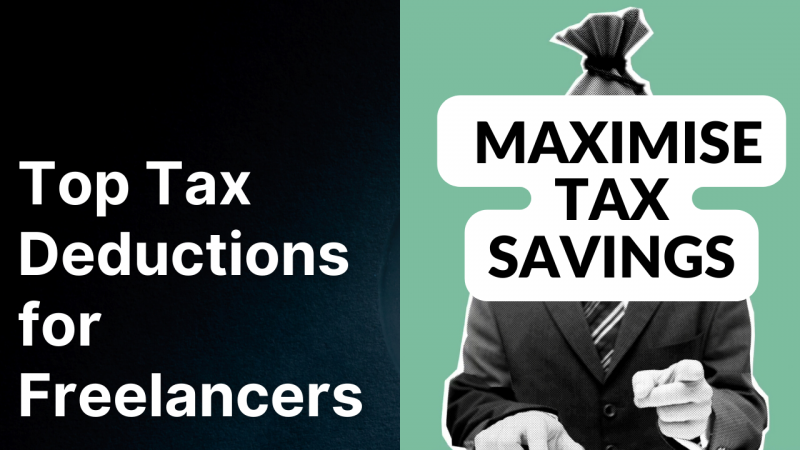Top Tax Deductions for Freelancers: Everything you Should Know About
By 2025, freelancing in India is estimated to grow to a value of $20 – $30 million and is expected to comprise 50% of the workforce. Interesting, right?
Freelancing in India is not merely a passion trend; rather, it signifies a fundamental shift in how we perceive and engage in work.
While freelancing offers flexibility and independence, it’s crucial to recognize that freelancers are not exempt from taxation. It’s essential to grasp what qualifies as taxable income and identify which tax deductions for freelancers are vital to claim for maximizing tax savings.
How freelancers generate income?
Freelancers earn money by offering their services for payment, working on a per-project or monthly basis, and completing assigned tasks within a specified timeframe.
You can be a graphic designer, marketer, programmer, content writer, or designer, offering your expertise while relishing the freedom to work from the comfort of your home or anywhere in the world.
What constitutes taxable income?
Under Indian income tax regulations, income earned through the utilization of your intellectual or manual abilities is categorized as professional income. This income is subject to taxation under the category of “Profits and Gains from Business or Profession.” Your total income will comprise all earnings received during the course of your professional activities.
Tax Planning
Tax planning is vital for freelancers as it allows them to maximize tax deductions, manage cash flow, minimize tax liabilities, and ensure compliance with tax laws. By identifying deductible expenses freelancers can reduce taxable income and save money on taxes.
Consider Sarah and John, two freelance graphic designers. Sarah diligently plans her taxes, tracking business expenses and maximizing deductions.
Meanwhile, John overlooks tax planning and misses out on deductible expenses. During tax season, Sarah owes less and keeps more of her income, while John struggles with higher taxes due to his lack of planning.
What expenses are eligible for deductions by freelancers?
According to income tax regulations, freelancers are required to pay taxes on their earnings, similar to salaried employees and business owners.
However, freelancers have the opportunity to deduct job-related expenses from their income. These expenses can range from office furniture to transportation costs for client meetings, as long as they are directly associated with the work being performed.
Here are the expenses that can be deducted from income while calculating tax-
- Rent paid for a property used for work purposes is deductible.
- Expenses associated with the repair or maintenance of property or assets.
- Expenses related to work, such as purchasing a printer, office supplies, monthly telephone and internet bills, and transportation costs, are eligible for deduction.
- Travel expenses for meeting clients within or outside of India can be claimed as deductions.
- Deductions are allowed for expenses incurred during client meetings, dinners, or outings aimed at acquiring new business or retaining existing clients.
- Costs associated with depreciation of assets used on the job
Presumptive Taxation Scheme
Section 44ADA is a special provision for calculating the profits and gains of small professionals in certain circumstances.
Under the presumptive scheme of taxation, profits are presumed at 50% of the gross receipts.
Let’s understand this with an example:
Maya’s annual turnover from her freelance design business is ₹40 lakhs.
Under the PTS, she is required to presume 50% of her gross receipts as her income. This means Maya’s presumed income for the year is Rs. 20 lakhs.
As per the income tax laws, Maya is now liable to pay taxes on her presumed income of ₹20 lakhs, rather than having to meticulously track and calculate her actual expenses.
This simplifies Maya’s tax calculations significantly, saving her time and effort.
Who is eligible for presumptive taxes?
Eligible professionals include those in interior decoration, technical consulting, engineering, accounting, legal, medical, and architecture fields.
Additionally, movie artists such as producers, editors, actors, directors, musicians, and costume designers, as well as authorized representatives representing others for a fee, are eligible. Other notified professionals may also qualify.
What are the available tax deductions for freelancers in India?
Freelancers can utilize various tax deductions and exemptions, including:
- Section 80 C: Offers a tax deduction for freelancers of up to INR 1.5 lakhs on investments in schemes like ELSS, ULIP, FDs, and payments such as tuition fees.
- Section 80 CCC: Provides a tax deduction for freelancers against pension plans with a limit of INR 1.5 lakhs.
- Section 80 CCD: Allows deductions on investments in Central Government Pension Schemes.
- Section 80 CCF: Exempts investments towards long-term infrastructure bonds of up to Rs 20,000.
- Section 80 CCG: Offers an exemption of up to INR 25,000 on investments in the government Equity Savings Scheme.
- Section 80 D: Allows deductions on expenses for health insurance premiums.
- Section 80 DD: Provides an exemption for treatment of normal or severe disabilities, up to INR 1.25 lakhs.
- Section 80 G: Allows a 100% deduction on donations to charitable trusts and relief funds.
- Section 80 E: Offers tax deduction towards education loans.
- Section 80 EE: Provides tax benefits against payments made towards residential loans, available for up to INR 50,000.
Ultimately, whether it’s optimizing deductions, leveraging the PTS, or staying informed about tax regulations, proactive tax planning is essential for freelancers to maximize their earnings and ensure financial stability in their freelance journey.
If you’re ready to take control of your freelance journey and access a wealth of opportunities, register on Truelancer, a leading freelance marketplace. Join our community today and realize your potential to thrive in your freelance career!
